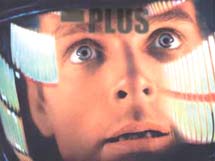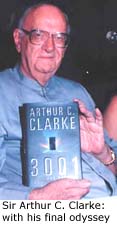
7th January 2001
News/Comment|
Editorial/Opinion| Business|
Sports| Mirror Magazine


- How 2001 began
- Buddhism and Buddha's personality
- Biblical lessons in dramatic splendour
- Can he sublet?
- "I watched them being hanged"
- Human smugglers, the new predators
- OOh it's him, he's here!
- Remembering two intellectual giants
- Let Drieberg's 'lamp of life' shine on
- Loss of identity, security and trust
- WYSIWIG
- The state of the estates
- 2001: What lies ahead?
- Letters to the editor







How 2001 began
By Richard Boyle
Mention the name Arthur C. Clarke and what comes instinctively to mind? One of two things, probably: the idea of the communications satellite . . . or the classic film 2001: A Space Odyssey - Patrick Moore. One
morning in February 1964, an employee of the General Post Office arrived
at work not knowing that this was to be an extraordinary day. In fact,
he was forever to remain blissfully unaware of the essential difference
of that day, as well as his role in the scheme of things. His job, in an
era of primitive communications, was to deliver overseas cables by hand,
and on that particular, fateful day, he was destined to deliver one to
a house down Gregory's Road in Colombo 7.
One
morning in February 1964, an employee of the General Post Office arrived
at work not knowing that this was to be an extraordinary day. In fact,
he was forever to remain blissfully unaware of the essential difference
of that day, as well as his role in the scheme of things. His job, in an
era of primitive communications, was to deliver overseas cables by hand,
and on that particular, fateful day, he was destined to deliver one to
a house down Gregory's Road in Colombo 7.
What he was thinking of as he extracted the cable from his delivery book while walking towards the house is a matter for conjecture. Probably it was concerning the mundane: his wife's impending childbirth, his landlord's reluctance to repair the leaking roof, his mounting credit with the mudalali maybe. Certainly he would not have been pondering the mysteries of the universe and the possibility of extra-terrestrial life, or musing on a project to encompass these themes in a major Hollywood movie. Yet such matters comprised the contents - and the outstanding potential - of the cable his fingers now held firm.
As he checked the name in his delivery book against that on the cable, perhaps he noticed the recipient was a sudhu mahattaya. Perhaps he had delivered other cables to this house, and had come to learn that the Occidental resident was a writer of futuristic stories set both among the stars and beneath the seas. Perhaps he was familiar with the name Arthur C. Clarke and had even caught a glimpse of the great man himself on a previous delivery. What he could not have comprehended on that February day was his role as a messenger of the muse of creation, for the cable was to be instrumental in bringing together two fine minds in one of the most fruitful collaborations in the history of cinema, possibly the whole of human artistic endeavour.
On reading the cable, Arthur found that it was from a friend, Roger Caras, inquiring whether he would be interested in "doing a film on ETs" with the director Stanley Kubrick, whose recent release Dr. Strangelove was fast gaining critical acclaim. The cable ended with a puzzling remark by Caras that Kubrick "thought you were a recluse." Later, Arthur was to learn of the story behind this remark, and, indeed, of the cable itself.
Caras was having lunch with Kubrick at Trader Vic's in New York and asked the director what type of film he intended to make next. Kubrick told him he wanted to do something on extra-terrestrials, that he was reading "everything by everybody" to find a suitable writer and collaborator for the project. When Caras suggested that he should "start with the best" - Arthur of course - Kubrick replied, "But I understand he's a recluse, a nut who lives in a tree in India someplace." Caras retorted, "Like hell. He's not a recluse or a nut. He just lives quietly in Ceylon."
Saddled with such misconceptions, Kubrick would have been surprised to learn at that luncheon (as he would be sometime later on) that Arthur had been far from reclusive or inactive in the eight years he had already lived in Ceylon.
He had travelled abroad regularly on lecture tours and the like. He had dived in the seas around the island along with Mike Wilson and Rodney Jonklaas. He had even headed a successful underwater treasure hunt, and, if proof was necessary, the clumps of silver coins salvaged from the wreck (off the Great Basses Reef) nestled in a chest in his Gregory's Road office.
Things happened at a surprising pace after Caras's cable was delivered and the contents digested. Not wishing to waste such an opportunity (especially as none of his stories had yet been produced as a film) Arthur promptly replied Caras, saying he would be "frightfully interested in working with the enfant terrible." In addition, he requested Kubrick to contact his agent, Scott Meredith. Following discussions regarding the project with Meredith, Kubrick wrote directly to Arthur for the first time in March, a few weeks later.
"He wanted to do the proverbial 'really good' science fiction movie," says Arthur of this letter. Kubrick went on to list his main interests in pursuing the theme of extra-terrestrials: "(1) The reasons for believing in the existence of extra-terrestrial life. (2) The impact (and perhaps lack of impact in some quarters) such a discovery would have on Earth in the near future."
This letter further aroused Arthur's curiosity and he became anxious to meet Kubrick to discuss the project in more detail. Fortunately, he was due to travel to New York in a few weeks to complete work on Time-Life Science Library's Man and Space, the main text of which had been written in Colombo. Arthur prepared for his eventual meeting with Kubrick by trawling through his published fiction for ideas that could be used for the type of film envisaged.
"I quickly settled on a short story called 'The Sentinel,' written over the 1948 Christmas holiday for a BBC contest," Arthur reminisces in his biography. "It was this story's idea which I suggested in my reply to Kubrick as the take-off point for a movie. The finding - and triggering - of an intelligence detector, buried on the Moon aeons ago, would give all the excuse we needed for the exploration of the Universe."
In the end six other stories would become elements in both the screenplay and novel of the film, but it was the decision taken in Colombo regarding 'The Sentinel' that initiated the elaborate creative process.
Arthur embarked on the journey from Colombo to New York in mid-April not knowing that the project would delay his return to Ceylon until June of the following year.
During this time a number of milestones in the project would be reached - a collaborative agreement between Arthur and Stanley Kubrick, the writing of the novel if not the screenplay, and the decision by MGM to fund the project - but the production would not begin until December 1965.
It was in April 1965 that Kubrick chose the title 2001: A Space Odyssey. Thirty-five years into the future, 2001 was felt to be distant enough in time to ensure that the film's future realism would not be undercut by reality. For several decades now, the year 2001 has been inextricably associated (more or less world-wide) with the film.
In 1965 or thereabouts, however, it was merely a number connected (in England at least) with a brand of carpet shampoo made popular by a long running TV commercial.
This, as I well remember, featured a stereotypical 1960s housewife cheerily mopping away at her carpet, while a jingle jangled: "2001 cleans a big, BIG, carpet for less than half-a-crown."
Now the time has arrived for 2001 to encounter the year of its setting, as happened in recent decades to another futuristic work with a date-specific title - George Orwell's 1984.
![]()
Front Page| News/Comment| Editorial/Opinion| Plus| Business| Sports| Mirror Magazine
Please send your comments and suggestions on this web site to

